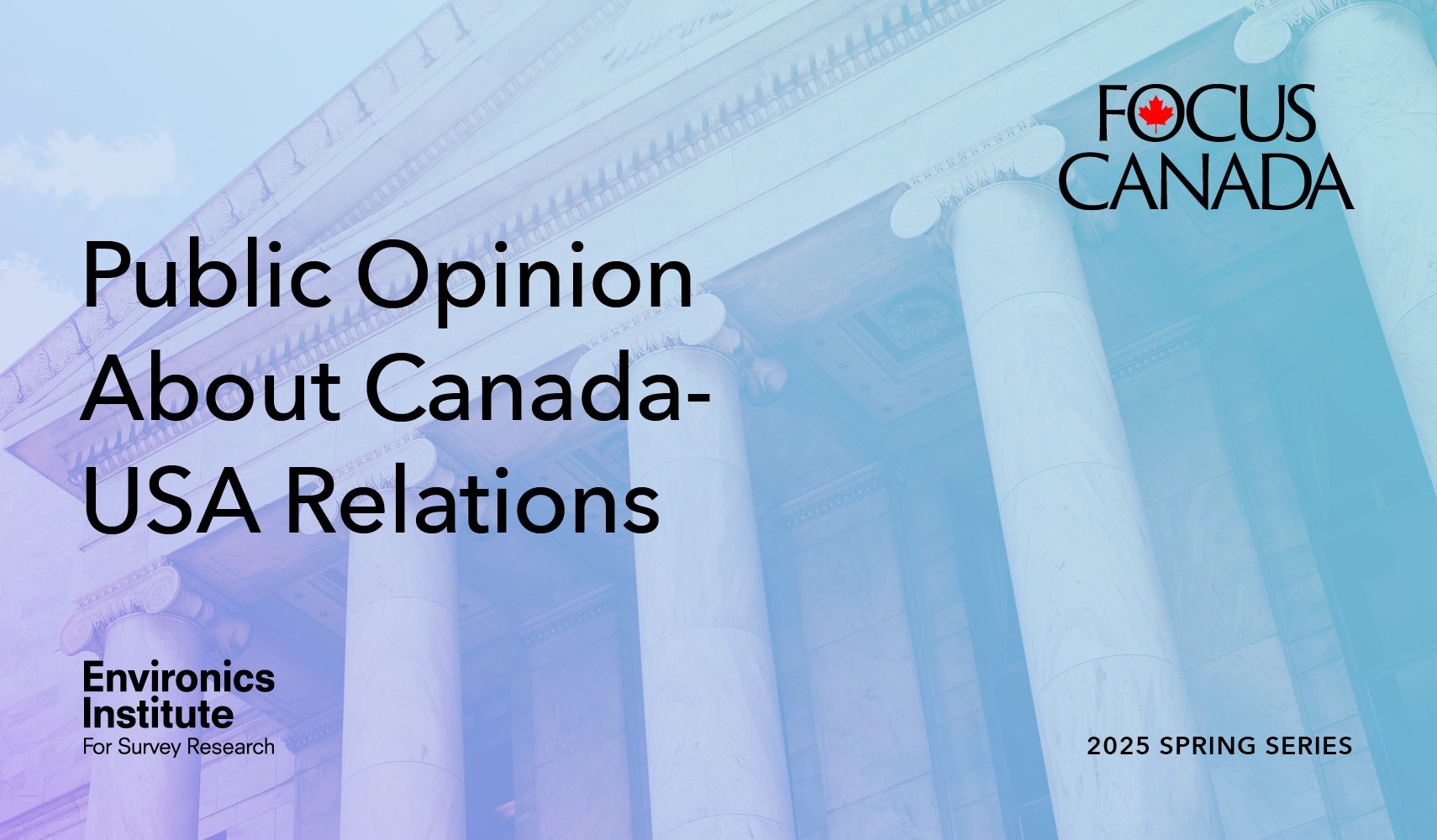Public opinion about Canada-USA Relations

As part of its Focus Canada public opinion research program (launched in 1976), the Environics Institute updated its research on Canadian attitudes about Canada-USA relations.
This survey is based on telephone interviews conducted (via landline and cellphones) with 2,000 Canadians ages 18 plus between May 5 and 18, 2025. A sample of this size drawn from the population produces results accurate to within plus or minus 2.2 percentage points in 19 out of 20 samples. All results are presented as percentages, unless otherwise noted.
Executive Summary
Canada and the United States have enjoyed a strong relationship for more than a century. There have been ups and downs depending on the respective leaders in each country, but underneath remained a solid foundation of trust and partnership. This has played out through expanding integration across the two economies, an enduring defense partnership through NATO and the Strategic Air Command, and a welcoming coast-to-coast border easily crossed by countless Canadians and Americans for business, leisure and family visits.
The second Trump administration has quickly upended this historic relationship, through punitive tariffs on Canadian industry, intrusive border restrictions, and repeated talk of absorbing Canada as the US 51st state. This sudden aggressive posture from a long-trusted ally now poses the greatest existential threat to Canada since its founding as a Dominion in the mid 19th century (an act prompted in large part by fears of US annexation at that time).
In Canada, public reaction to these events has been swift and unequivocal, as revealed in the latest Focus Canada survey which was conducted May 5 to 18, 2025. Canadians have become much more negative in their view of the United States and more “elbows up” confident in their own country as a sovereign nation.
Public favourability of the United States has plummeted over the past eight months, equaling the negative views expressed towards the end of Trump’s first term in office. As in 2020, Canadians are now more than twice as likely to hold an unfavourable view of the USA as a favourable one. What is different this time is the speed in which the shift has taken place: Canadians’ dislike of the US shot up in a matter of a few months since the new administration took office in Washington in January, compared to the three years it took for this perspective to take hold during Trump’s first term. Canadians may feel negative about the USA for a number of reasons but it most clearly reflects a dislike of Donald Trump, as close to eight in ten disapprove of his performance as President.
Moreover, Canadians’ response to concerns about events in the United States has now expanded beyond general opinions to more concrete action. One-third report they have already changed their plans for travelling to the USA this year because of the current political climate in that country. This is double the proportion who said they cut back on US travel in 2017, during the first Trump administration. In 2025, one in four say they never considered plans for visiting the USA this year, also a higher number than before and further indication of how Canadians are now choosing to travel elsewhere.
The unprecedented current threat to the country’s sovereignty is likely to remain unresolved for some time, but the idea of becoming part of the United States is a non-starter for most Canadians. Nine in ten disagree (with 8 in 10 in strong disagreement) with the idea that the two countries should someday unite into one, compared with fewer than one in ten expressing support. Again, public opposition to such a merger is stronger than in the 1980s during the national debate about free trade.
Most Canadians also express confidence in the future of the country’s sovereignty. In the face of the current threat emanating from the United States, seven in ten believe it is very likely that Canada will remain an independent country; only one in ten think this outcome is in doubt. Such widespread public confidence in Canada’s future is all the more notable given that it is much stronger than what it was in 1990 shortly after the signing of the Canada-US Free Trade Agreement.
These latest shifts in public opinion about the United States and Canadian sovereignty reflect national trends, as they are evident across the country and among most identifiable groups. Positive views of the USA, President Trump and uniting the countries are a bit higher in the Prairie provinces and among younger Canadians, but these reflect marginal differences; similarities with other Canadians stand out more than differences.
What stands out clearly is the perspective of those who voted for the federal Conservative Party in the election held just before this survey was fielded. Compared with other Canadians, Conservative voters are twice as likely to remain positive in their opinion of the United States, approve of Donald Trump’s performance, and support a future merger of the two countries.
Like what you're reading? With our bi-monthly e-newsletter, you can receive even more with the latest details on current projects, news, and events at the institute.
Subscribe